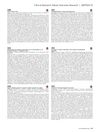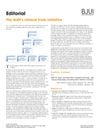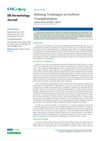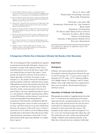 December 2017 in “The journal of investigative dermatology. Symposium proceedings/The Journal of investigative dermatology symposium proceedings”
December 2017 in “The journal of investigative dermatology. Symposium proceedings/The Journal of investigative dermatology symposium proceedings” The summit aimed to speed up finding treatments for alopecia areata.
[object Object] December 2017 in “Facial plastic surgery” Hair transplants can effectively treat facial hair loss from trauma.
 November 2017 in “Dermatologic Therapy”
November 2017 in “Dermatologic Therapy” A new topical solution safely reduces hair shedding by 38% on average by tightening a muscle in the scalp.
 May 2017 in “Journal of Investigative Dermatology”
May 2017 in “Journal of Investigative Dermatology” Psoriasis patients experience moderate functional impairment related to disease severity and less satisfaction.
 April 2017 in “Journal of Investigative Dermatology”
April 2017 in “Journal of Investigative Dermatology” Certain microRNAs may protect against hair loss in alopecia areata and could be potential treatment targets.
 April 2017 in “Journal of Investigative Dermatology”
April 2017 in “Journal of Investigative Dermatology” Deep phenotyping helps distinguish between xeroderma pigmentosum and trichothiodystrophy, aiding in diagnosis and treatment.
 April 2017 in “The FASEB Journal”
April 2017 in “The FASEB Journal” Eating more vitamin A changes hair growth-related proteins in mice, affecting hair cycle stages.
April 2017 in “The Journal of urology/The journal of urology” Using more low-cost and generic drugs could save Medicare Part D a lot of money.
 March 2017 in “BJU international”
March 2017 in “BJU international” The BJUI supports clinical trials as key for unbiased medical evidence and works to enhance their design, reporting, and discussion.
March 2017 in “Current dermatology reports” Topical JAK inhibitors can effectively treat alopecia areata and vitiligo by modulating immune responses.
 January 2017 in “SM dermatology journal”
January 2017 in “SM dermatology journal” Eyebrow hair transplants have high patient satisfaction and require surgeons to have artistic and technical skills.
September 2016 in “Case Reports in Internal Medicine” Chronic arsenic toxicity can cause diabetes and may not improve even with treatment.
August 2016 in “The journal of investigative dermatology/Journal of investigative dermatology” Different types of skin cells create unique support structures that can affect skin cell growth and could help in skin repair.
[object Object] 
Modern hair restoration techniques can effectively treat hair loss and provide natural-looking results.
September 2015 in “Hair transplant forum international” Platelet Rich Plasma may help treat hair loss, but more detailed research is needed to confirm its effectiveness.
 July 2015 in “Cambridge University Press eBooks”
July 2015 in “Cambridge University Press eBooks” The document concludes that careful history and physical exams are crucial for accurately diagnosing polycystic ovary syndrome and distinguishing it from other similar conditions.
 May 2015 in “Hair transplant forum international”
May 2015 in “Hair transplant forum international” The article concludes that PRP might help with hair loss, but more detailed research is necessary.
 March 2015 in “Hair transplant forum international”
March 2015 in “Hair transplant forum international” Finasteride can help treat men's hair loss but may have side effects.
 February 2015 in “Dermatologic Surgery”
February 2015 in “Dermatologic Surgery” Smaller reticle sizes are as accurate as the standard size for measuring hair density in hair restoration.
 January 2015 in “Springer eBooks”
January 2015 in “Springer eBooks” Hair damage shows as fragility, dullness, and discoloration, varies by ethnicity, and is worsened by cosmetic procedures and diseases.
 January 2015 in “Springer eBooks”
January 2015 in “Springer eBooks” Hair health is influenced by genetics, aging, and environmental factors, with proper care needed to maintain it.
January 2015 in “Springer eBooks” Healthy hair is crucial to avoid dryness, weakness, and breakage.
 January 2015 in “Dermatology online journal”
January 2015 in “Dermatology online journal” A man with total hair loss also developed a rare nail condition, likely due to autoimmune issues.
 January 2015 in “Hair transplant forum international”
January 2015 in “Hair transplant forum international” Unable to provide a summary as the text doesn't contain a conclusion.
October 2014 in “Cancer research” Blocking mTORC1 reduces skin tumor growth in mice.
 September 2014 in “Hair transplant forum international”
September 2014 in “Hair transplant forum international” Caffeine, niacinamide, and panthenol may improve hair growth, fullness, and healing when applied to the scalp.
 July 2014 in “Disease-a-Month”
July 2014 in “Disease-a-Month” The document gives treatment advice for various skin conditions, like using metronidazole for perioral dermatitis and minoxidil for hair loss.
 July 2013 in “Hair transplant forum international”
July 2013 in “Hair transplant forum international” Whey protein shakes have not been proven to increase hair growth.
 January 2013 in “Hair transplant forum international”
January 2013 in “Hair transplant forum international” Both surgical hairline advancement and follicular unit transplantation effectively lower the female hairline, but they differ in speed, scarring, and naturalness of results.
 May 2012 in “Journal of Clinical Oncology”
May 2012 in “Journal of Clinical Oncology” Taking 5-alpha reductase inhibitors might be linked to breast cancer in men.






















